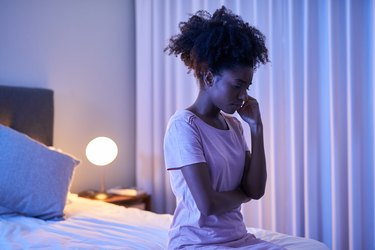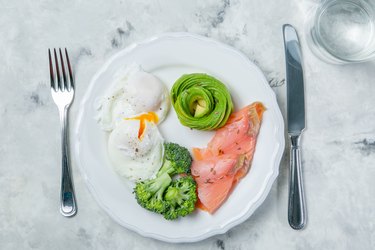
Your sleep quality is a big part of your overall health and can affect your brain function, eyesight and even heart health. But sometimes tweaks to your daily eating routine can throw your shut-eye off track.
Low in carbs and high in fat, the keto diet is praised for its ability to spur weight loss and increase energy. But if you've recently hopped on the bandwagon, this may be the reason you're having trouble sleeping. Here's what to know about keto insomnia and how to get back to a good night's sleep.
Video of the Day
Video of the Day
Read more: 5 Possible Risks of a Keto Diet
What Causes Keto Insomnia?
Think back to the last time you had the actual flu — how was your sleep then? Likely fitful. The keto flu, a common side effect of the diet, follows the same concept.
In order to pinpoint why your new diet might be causing sleepless nights, it's helpful to understand what's going on in your body. If you have lowered your carbs enough — 20 to 50 grams is standard, according to a March 2019 article published in StatPearls — and increased your fat intake sufficiently, your body has likely entered a metabolic state called ketosis.
Now, your body no longer has glucose — the byproduct of carbohydrate metabolism — as its preferred source of energy, so it must find its second-best option, which is fat. The breakdown of fatty acids produces substances called ketone bodies, which can be used as a source of energy, according to the above-mentioned article.
This is a big shift for your body and can cause symptoms like headache, bad breath or muscle ache, according to the Mayo Clinic. In some cases, keto flu can also leave you tossing and turning all night.
So, you're really tired, yet you can't sleep. And you have some other symptoms to boot. All in all, it's not going to be a great week.
Read more: 5 Simple Steps to Get the Best Night of Sleep Ever

Other Reasons You Can't Sleep on Keto
There may be other more specific explanations behind your interrupted sleep while on the keto diet:
1. You're Actually Hungry
The keto diet claims to surpass other diets because of fat's ability to keep you satiated, according to the Mayo Clinic. After following the diet for a period of time, you may begin to feel less hunger, but that may not be the case at the beginning of the diet.
Fat is a satiating macronutrient, but it may not be enough to keep your appetite suppressed, according to a January 2015 study published in Obesity Reviews. If the diet leaves your stomach grumbling at the end of each day, you may struggle to fall or stay asleep.
2. Fat or Fiber Are Causing Digestive Issues
You may be experiencing stomach upset as your body adjusts to all the added fat and fiber you're eating. Bloating, gas and diarrhea are common effects of diets high in fat, and those can certainly keep you from getting a good night's sleep, according to the National Institute of Diabetes and Digestive and Kidney Diseases.
Diets high in fiber can also be taxing on the digestive system. If you're following a more plant-based approach to keto, your high fiber intake may cause your body to produce excess gas, according to the International Foundation for Gastrointestinal Disorders.
3. New Ingredients Are Keeping You Awake
People who start the keto diet often add new foods to help adjust to the diet. Bulletproof coffee — a mix of black coffee, grass-fed butter and coconut oil — is one of the most popular keto-diet drinks, according to the Mayo Clinic, and it may explain why you're tossing and turning. An increase in caffeine can spike energy levels, making it more difficult to fall asleep (depending on how long before bed you're drinking it).
Did you start taking any supplements aimed at keto-dieters? Collagen, medium-chain triglycerides (MCT) oil, or beta-hydroxy ketones are all popular additions to the keto diet. These supplements claim to boost energy, but few are actually FDA-regulated. So, they may cause difficulty sleeping.
Supplements may also contain other ingredients that can interrupt your sleep. Cocoa powder, which contains caffeine, is a common additive. Green tea, yerba mate, guarana and kola nut are other caffeinated ingredients often found in supplements, according to the USDA.

Solutions for Keto Insomnia
Insomnia can wreak havoc on your productivity, decreasing your energy, focus and drive, and it can affect your immune function, too, according to the Mayo Clinic. Combined with the other side effects of the keto diet, it can make you miserable.
The good news is that if you've just started keto, your symptoms, including sleeplessness, are likely to subside as your body adapts to the dietary change. But if you've been on the diet for a while and are experiencing insomnia, it's likely not the best diet for you.
No matter the cause, finding a solution — fast — is high-priority.
It never hurts to check in with your doctor for advice. In the meantime, the National Institutes of Health offers some natural remedies for insomnia:
- Find a pre-bedtime routine that promotes sleep — take a warm bath, listen to relaxing music or read a book. Avoid electronics, including phone, tablet, computer and TV, before bed.
- Schedule exercise at least five hours before bedtime and avoid eating big meals right before turning in.
- Make sure your bedroom is conducive to good sleep — dark, quiet and cool. Keep pets out of your bedroom at night to minimize distractions.
- Set a sleep schedule, going to bed and getting up at the same time every day — even on weekends. If possible, avoid working night shifts or rotating schedules.
- Keep caffeine before noon to avoid its effects lasting into bedtime.
- StatPearls: "Ketogenic Diet"
- Mayo Clinic: "Low-Carb Diet: Can It Help You Lose Weight?"
- Plos One: "Which Foods May Be Addictive? The Roles of Processing, Fat Content, and Glycemic Load"
- USDA: "Caffeine-Containing Ingredients in Dietary Supplements: Guarana, Kola Nut, Yerba Mate, Tea, and Cocoa "
- Mayo Clinic: "Lack of Sleep: Can It Make You Sick?"
- NIH: "Insomnia"
- Obesity Reviews: "Do Ketogenic Diets Really Suppress Appetite? A Systematic Review and Meta‐analysis"
- National Institute of Diabetes and Digestive and Kidney Diseases: "Eating, Diet, & Nutrition for Gas in the Digestive Tract"
- International Foundation for Gastrointestinal Disorders: "Foods that May Cause Gas"